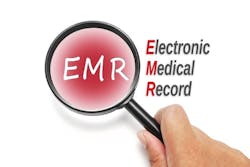Ascension, Google Expand Pilot of EHR Search Tool for Clinicians
Leaders at Google and the St. Louis, Mo.-based Ascension say they are expanding the clinical pilot of an electronic health record (EHR) search tool that aims to help clinicians find relevant medical record data.
In a Feb. 23 blog post, Google Health’s vice president, product and design, Paul Muret, said that the technology, called Care Studio, “is a software solution that provides a comprehensive view of a patient’s records and allows clinicians to quickly search through complex patient information.” The tool is built for clinicians and works alongside EHR systems, Muret added.
Google and Ascension have been working in tandem on a pilot of Care Studio focused on data quality and product safety with a small group of clinicians based in Nashville, Tenn., and Jacksonville, Fla. The pilot is now expanding to more physicians and nurses in the clinical setting, he said, and eventually the goal is to make the clinical search tool available to all off Ascension’s caregivers.
Providing more detail, Care Studio, Muret wrote, brings together patient records from the multiple EHRs an organization uses, with the aim of giving clinicians a centralized view of patient data and the ability to search across these records. For example, even though health systems report measurements like blood pressure or glucose levels using different units, Care Studio automatically converts them, designed to make it easier for a clinician to understand and compare.
He further noted that developers have honed search capabilities based on medical terminology and clinical shorthand, so that clinicians can simply type what they're looking for into a search bar and instantly surface relevant patient record information. Of course, oftentimes a patient’s history can be long and complex, making important details difficult to find.
As such, Care Studio uses Google technology to display relevant information in fewer clicks, Muret stated. For example, he offered, Care Studio can automatically organize the medications in a patient’s history with information on dosing and when they were prescribed. The tool also makes it easier to find pertinent information, including lab results, procedure orders, medication orders and progress notes, he asserted.
The blog post referenced a commonly cited 2016 study by healthcare stakeholders, published in the Annals of Internal Medicine, that found many clinicians spend half their day on a computer navigating EHRs and other systems. “Because health records are often scattered across multiple systems, getting a full picture of a patient’s health requires a great deal of clinicians’ time, energy, and resources. These gaps in patient information can contribute to less effective and efficient care,” Muret wrote, speaking to the motivation behind this project.
In a separate post , Eduardo Conrado, executive vice president, strategy and innovation, at Ascension, noted that the work between the health system and Google began in 2018, with the goal “to reimagine the organization of clinical data in order to make Ascension’s information more effective in supporting the care delivered by our providers.”
He added that the Care Studio approach “is grounded on a foundation of clinician user research, involving feedback from our physicians and nurses from a variety of specialties. It provides new functionality and a simple user interface that allows clinicians to see information from both inpatient and outpatient Ascension facilities, and to quickly search through that information to find what is needed at that moment.”
Ascension believes that because this clinical search capability surfaces the specific information requested and additional contextually relevant information that might otherwise require significant time and effort to uncover, the provider experience will be directly enhanced “by enabling quick access to patient information and enriching the information that is available.”
Importantly, he noted, this solution “is an optional support tool and does not replace existing EHR systems. Rather, it complements existing EHR systems and provides a single interface to search varied, and previously siloed, data systems and streams.”
In their respective posts, both companies addressed patient privacy concerns that stemmed from reports in 2019 that Google and Ascension were working on a project that aims to leverage the tech giant’s search and artificial intelligence (AI) capabilities to analyze health data for millions of Ascension patients. A Wall Street Journal report at that time noted that “neither patients nor doctors have been notified [about this initiative]. At least 150 Google employees already have access to much of the data on tens of millions of patients, according to a person familiar with the matter and the documents.” The concerns were significant enough that they led to a federal investigation by HHS.
In its post, Ascension stated that its “use of Care Studio tool complies with all applicable regulations, including the Health Insurance Portability and Accountability Act (HIPAA), and the work with Google is covered by a Business Associate Agreement (BAA) that governs protected health information (PHI).”
Google’s post added, “We know healthcare data is sensitive and personal, and it’s our responsibility to keep it private and secure. Google does not own, nor do we ever sell, patient data. This data from Care Studio cannot be used for advertising. Our team designed Care Studio to adhere to industry best practices and regulations, including HIPAA.”


